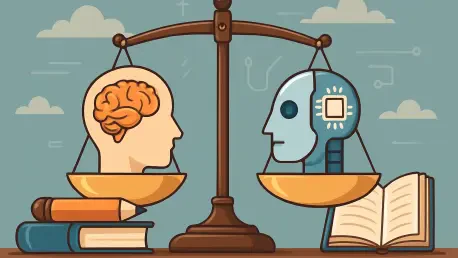As technology continues to reshape the educational landscape, artificial intelligence (AI) stands at the forefront of transforming how knowledge is acquired and applied in both academic and professional environments. With the promise of personalized learning experiences and streamlined processes, AI tools have captured the attention of educators and learners alike, offering solutions that seem almost tailor-made for modern challenges. Yet, beneath this veneer of innovation lies a pressing concern: the risk of cognitive offloading, where reliance on AI may undermine critical thinking and deep comprehension. This delicate balance between harnessing AI’s advantages and safeguarding essential mental skills forms the crux of an ongoing debate. While the potential to enhance learning outcomes is undeniable, there is a growing need to address how over-dependence on these tools might erode the very foundation of intellectual growth, prompting a closer examination of their role in education.
The Promise of AI in Educational Settings
The integration of AI into learning environments has opened up remarkable possibilities for tailoring education to individual needs, a development that many see as revolutionary. Advanced algorithms can analyze a student’s strengths and weaknesses, crafting customized study plans that adapt in real time to ensure optimal progress. Such personalization has shown significant potential to improve outcomes across diverse groups, with industry insights suggesting that a substantial majority of students could benefit from AI-driven approaches. Beyond academics, AI also offers support in areas like mental health, providing resources and guidance when paired with human oversight. This adaptability makes AI a powerful ally in addressing gaps in traditional education systems, particularly for those who struggle with conventional methods. The efficiency brought by these tools cannot be overstated, as they save time and resources while delivering content in innovative formats that engage modern learners.
However, this promise comes with a caveat that demands careful consideration in how AI is implemented within educational frameworks. While the benefits of efficiency and customization are clear, there is a risk that these tools may create a false sense of mastery among users. Students might feel confident when using AI assistance, only to falter when faced with independent challenges, revealing a gap between perceived and actual understanding. This illusion of competence, often observed in tasks like writing or problem-solving, highlights the importance of using AI as a supplement rather than a crutch. Educators must ensure that the technology enhances rather than replaces the effort required for genuine learning. The focus should remain on fostering an environment where AI supports active engagement, encouraging learners to grapple with concepts in a way that builds lasting skills rather than temporary solutions.
The Risks of Cognitive Offloading
Delving into the darker side of AI’s role in learning, the phenomenon of cognitive offloading emerges as a significant concern that could reshape how intellectual abilities develop over time. When learners delegate mental tasks to AI tools, there is a tangible danger of weakening critical thinking and problem-solving skills, as the brain misses out on the rigorous exercise needed for deep understanding. Cognitive psychology research underscores that true learning demands active engagement with material, much like physical training strengthens muscles. Bypassing this process through overreliance on technology can lead to superficial knowledge, leaving individuals ill-prepared for situations where AI is unavailable. Public discussions on social platforms amplify these worries, with educators noting a decline in students’ ability to perform independently and expressing fears about diminishing work ethic and judgment in the long run.
From a neuroscience perspective, the limitations of AI further compound these risks, as the technology lacks the emotional depth and subjective experience inherent to human cognition. While AI excels at pattern recognition and data processing, it cannot replicate the nuanced creativity and empathy that underpin meaningful learning. Academic studies warn that outsourcing thinking to such systems may erode the internalization of complex ideas, resulting in a shallower grasp of subjects. This is particularly troubling in professional contexts, where independent decision-making and innovative thinking are often paramount. The broader implication is a potential atrophy of cognitive skills across generations if AI continues to be used as a primary resource rather than a supportive tool. Striking a balance becomes essential to prevent technology from becoming a brain drain, ensuring that mental effort remains at the core of educational pursuits.
Strategies for Mindful Integration
Addressing the challenges posed by AI in learning requires a strategic approach that prioritizes active participation over passive dependence on digital tools. One effective method is the adoption of hybrid models where AI serves as a guide rather than a solver, prompting users to articulate concepts in their own words to reinforce memory and comprehension. Cognitive science supports this tactic, emphasizing the value of effortful recall in solidifying knowledge. By designing AI systems to require meaningful input from users, developers can foster an environment of engagement that mirrors the natural challenges of learning. This approach transforms AI into a workout partner for the mind, preserving the intellectual rigor necessary for growth while still leveraging technological advancements to enhance the process.
Moreover, educators and professionals must advocate for intentional design in AI tools to ensure they complement human effort rather than replace it. This means creating systems that encourage critical thinking by posing questions or presenting problems without immediately offering solutions, thereby compelling users to think deeply. In lifelong learning and workplace training, such designs can cultivate a culture of continuous improvement rather than reliance on quick fixes. Opinions from academic and industry experts converge on the idea that technology should amplify cognitive skills, not diminish them. By integrating these principles, the educational sector can harness AI’s potential to personalize and streamline learning while safeguarding the essential human elements of creativity and independent thought. This balanced framework offers a pathway to mitigate risks and maximize benefits.
Reflecting on a Balanced Path Forward
Looking back, the exploration of AI’s role in learning revealed a landscape marked by both transformative potential and significant pitfalls, with cognitive offloading standing out as a critical issue that demanded attention. The journey through its benefits showed how personalization and efficiency reshaped educational experiences, while the risks highlighted the erosion of deep thinking when technology took center stage. Strategies discussed aimed at recalibrating this dynamic, ensuring AI acted as a supportive tool rather than a substitute for human effort. Moving forward, the focus should shift to actionable steps like developing AI systems that prioritize user engagement through active recall and critical problem-solving. Educators and developers must collaborate to embed these principles into future tools, creating environments where technology enhances intellectual growth. By committing to this balanced approach, the promise of AI can be realized without sacrificing the cognitive skills vital for personal and societal advancement.









